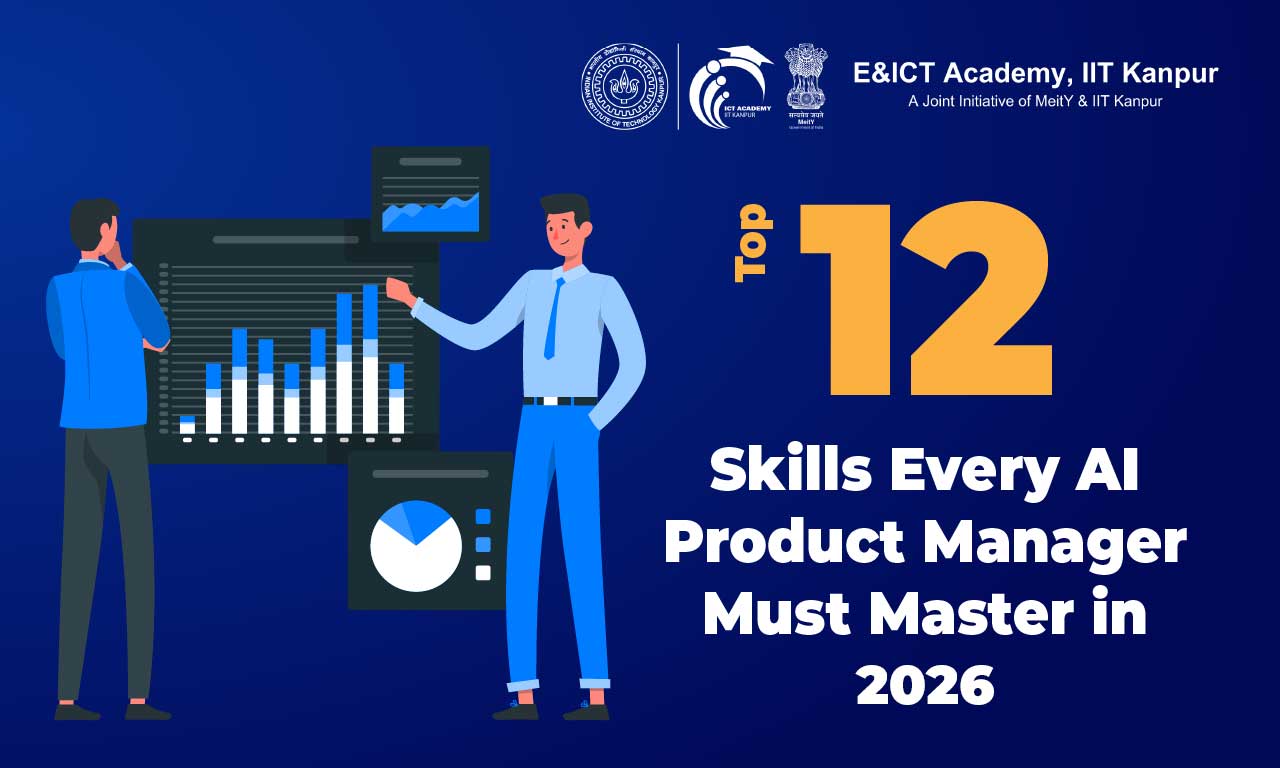Top 12 Skills Every AI Product Manager Should Master in 2026

AI Product Manager Skills: With artificial intelligence (AI) transforming the way companies function, the AI Product Manager (AI PM) career is also changing at a tremendous pace. Acting as intermediaries between business needs, AI capabilities, and end-user requirements, these experts drive innovation while ensuring strategic alignment. With 2026 being a year of further breakthroughs in AI technologies, the need for effective AI PMs will continue increasing.
To succeed in this ever-changing industry, an AI Product Manager must excel at various technical, analytical, and interpersonal skills. The following are the top 12 must-have skills that will characterize successful AI Product Managers in 2026.
Also Read: How to Become AI Product Manager in 2026
Best Product Manager Course in 2026
In today’s fast-moving tech world, a product management course helps you build the right skills to lead innovation and bring great ideas to life. The EICTA, IIT Kanpur Product Management Course stands out in 2026 for its practical approach, expert faculty, and strong industry focus. Backed by one of India’s top IITs, this program blends deep tech knowledge with real-world product strategy. If you want to build products that matter, this is the place to start.
Best AI Product Manager Course in 2026: Enroll Today!!
Key Technical and Strategic Skills AI Product Managers Need to Master
To thrive in 2026, AI Product Managers need to cultivate a combination of technical savvy and strategic vision. The best 12 skills given below will enable them to spearhead innovation, facilitate cross-functional alignment, and deliver successful AI product development.
1. Foundational Knowledge of AI and Machine Learning (ML)
A firm understanding of AI and ML fundamentals is mandatory. AI PMs need to be familiar with supervised, unsupervised, and reinforcement learning, neural networks, and NLP to hold discussions with data scientists and engineers. Although they won’t need to write code, they’ll have to be familiar with model behavior, training, and limitations.
To establish this foundational knowledge, look to check out the AI & Machine Learning courses under the EICT Academy at IIT Kanpur.
2. Product Lifecycle Management
AI products mature differently than conventional software because they are dependent on data quality and continuous training cycles. AI Product Managers need to be adept at the entire product lifecycle—beginning with idea generation and feasibility checks to prototyping, deployment, and post-launch optimization. They need to be familiar with MLOps (Machine Learning Operations), feedback loops management, and continuous model updates handling. Ethical implications, especially when scaling models affect actual users, should also be included in their planning and execution strategy.
3. Data Literacy and Strategy
Data is the foundation of AI, and product managers need to build good data literacy. This involves knowing how data is gathered, cleaned, annotated, and stored. They need to be able to evaluate data quality, detect gaps, and comply with privacy laws. Data drift, class imbalance, and bias awareness are necessary to ensure model accuracy and fairness. An AI PM must collaborate with data engineers and analysts to establish and refine data strategies that align with long-term product objectives.
Also Read: Best Way to Switch Career in Product Management
4. Cross-functional Collaboration
AI PMs typically work at the crossroads of heterogeneous teams involving engineering, data science, design, legal, and marketing. Successful collaboration is critical to the alignment of stakeholders, conflict resolution, and the generation of innovations. They have to convert business objectives into workable technical activities, communicate efficiently across departments, and enable feedback loops. They need good people skills and leadership abilities to help them navigate team dynamics and translate the product vision into efficient and accurate execution.
5. AI Product Strategy and Roadmapping
Strategic mind is a crucial AI Product Manager competency. They ought to be able to correlate AI-driven solutions against business goals and customer pain points. This encompasses defining success measures, monetization prospects, and use case prioritization in technical feasibility and impact order. A well-prepared roadmap encompasses data collection timelines, model testing, validation, and deployment timelines—making sure they are realistic and measurable to deliver.
6. Responsible AI and Ethics Knowledge
Against the growing concern about algorithmic bias and regulation of AI, responsible AI practice is becoming mandatory now. AI PMs must understand ethical standards such as fairness, accountability, transparency, and explainability. They must understand how AI systems can affect people and society and take proactive measures to minimize harms. EICT Academy’s Responsible AI module course gives complete knowledge about these emerging norms.
Must Read: Why Choose Product Management?
7. Understanding Model Evaluation Metrics
AI Product Managers must be comfortable with model performance measurement using appropriate metrics such as precision, recall, F1-score, accuracy, ROC-AUC, and confusion matrices. They must understand when to use each metric depending on the problem type—fraud detection, recommendation systems, or image classification. This ensures data-driven decision-making while experimenting, deploying, and performing A/B testing.
8. Technical Communication Skills
Translating complex AI concepts into stakeholder-friendly narratives is a key skill. AI PMs must write clear product requirements, define KPIs, and present results to both technical and non-technical audiences. A balance of storytelling and technical documentation ensures alignment and buy-in across teams.
9. Agile and Lean Methodologies
As with any software development process, agility is crucial. AI projects need more experimentation and iteration, though. AI PMs must implement hybrid frameworks that combine Agile practices with ML experimentation cycles. Knowledge of sprints, backlogs, Kanban boards, and test-driven development brings efficiency and transparency to workflows.
10. Business Acumen and ROI Focus
AI products should provide quantifiable business value. Whether it’s making processes more efficient, cutting costs, or driving user engagement, AI PMs have to link technical innovation with business results. Market dynamics, cost-benefit analysis, and unit economics enable one to justify investment and scale AI initiatives.
11. User Experience (UX) for AI
Developing a seamless and reliable user experience is tricky in AI products. The built-in uncertainty of models demands special care for design transparency, explainability, and feedback loops. PMs need to work together with UX designers to develop easy-to-use interfaces and establish user trust in AI-driven decisions. The Human-Computer Interaction (HCI) programs by EICT Academy offer good frameworks to develop AI UX design effectively.
12. Continuous Learning and Flexibility
AI is one of the fastest-growing technologies. An effective AI Product Manager has to be aware of developments such as generative AI, foundation models, federated learning, and shifting regulatory environments. Workshops, certifications, and professional networks are essential to remain ahead and prepared to deal with future challenges.
Shaping the Future of AI Product Leadership
As we enter 2026, AI Product Managers will be at the heart of defining how organizations leverage artificial intelligence. Becoming masterful in these 12 key skills is essential to building ethical, user-focused, and effective AI products. Whether you are new to AI from a different role or want to develop upon current skills, now is the time to invest in ongoing learning. Institutions such as EICT Academy at IIT Kanpur provide helpful programs to aid your development. By combining technical competency, strategic thought, and moral leadership, AI PMs will propel the intelligent future of innovation.



